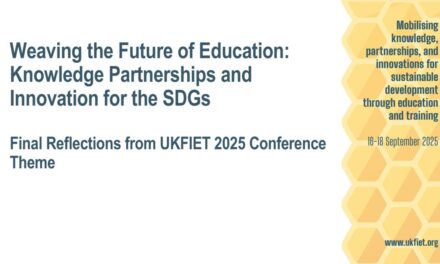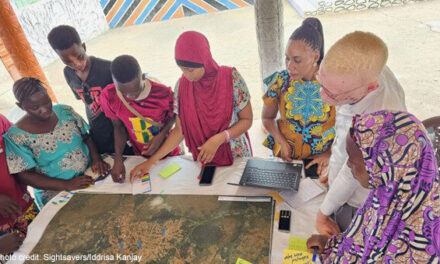This blog was written after the UKFIET September 2025 conference by the theme convenors of ‘Inclusion and intersectionality’, one of seven conference themes: Laraib Niaz, University of Cambridge; Samantha Ross, Link Education International; and Michelle Sandall, Save the Children.
The ‘Inclusion and Intersectionality’ theme at the 2025 UKFIET Conference brought together researchers, practitioners and policymakers from across the world to interrogate what inclusion means in practice, and for whom. Our aim in designing this theme was to move beyond narrow or siloed understandings of inclusion that focus on a single factor such as gender or disability, and instead explore the complex ways in which multiple identities interact within education systems. We sought a deep, varied and contextually-grounded exploration that could reveal both the barriers to inclusion and the creative, local strategies that challenge them.
The results were deeply insightful. Across diverse contexts and disciplines, presenters demonstrated that inclusion is not a single-issue concern, it is always lived at the intersections of class, language, ethnicity, gender, religion, geography and legal status. Spanning geographies from Myanmar, Palestine and Pakistan to Nigeria, Peru and Sudan, discussions revealed how histories, politics and everyday norms continue to shape who is included, who is excluded and whose knowledge counts.
The varied nature of inclusion and intersectionality
Across sessions, inclusion was interpreted in multiple, context-specific ways, each pushing back against the assumption that inclusion is one-dimensional, unchanging and only about access. Presentations tackled a wide spectrum of intersecting inequalities, exploring how education systems both reflect and reproduce social hierarchies, while also holding the potential for transformation.
A session on Navigating Gendered Worlds: Inclusion, Aspiration, and Identity reframed care through African and Islamic philosophies such as Ubuntu and Fard Kifayah, positioning care as an ethical and epistemic act that resists colonial and patriarchal legacies. A paper from Pakistan used new material feminist theory to analyse how classroom artefacts, uniforms, posture and voice regulation, shape gender norms in subtle but enduring ways. In northern Nigeria, the intersection of food distribution, gender and early learning outcomes reminded us that inclusion begins long before formal schooling.
Elsewhere, a paper from Palestine examined how ICT graduates navigate educational and professional pathways constrained by a constellation of intersecting exclusions, including military occupation, digital colonialism, donor-driven education policies and socio-economic instability, highlighting the double burden of marginalisation for young people living at the edge of multiple systems of inequality. Another study explored mobile phone-based numeracy support in Nepal, showing how digital interventions can open new spaces for participation among children who are otherwise excluded by remoteness, class and gender norms. Together, these contributions underscored the nuanced, layered nature of intersectionality in education.
Participatory and decolonial methods
A strong current across the theme was the growing use of participatory and decolonial methodologies to centre lived experience and amplify voices from the margins. Presenters experimented with creative, child- and youth-led approaches that foregrounded agency, emotion and imagination as valid forms of knowledge.
A powerful Myanmar study employed portraiture, an arts-based method, to explore how university students imagine hope and belonging amid political repression. Another striking example came from Nigeria, where doctoral research grounded in George Dei’s anti-colonial theory examined language practices in secondary schools through participatory and transformative tools, such as Theatre of the Oppressed. Students’ creative resistance through performance, translation and play illustrated how young people assert agency in the face of linguistic and cultural hierarchies.
Elsewhere, studies using the ‘River of Life’ methodology examined how gender, disability and violence intersect in Ugandan schools, while another project explored the professional identities of South Asian heritage teachers in the UK through visual narratives and reflective dialogues. These participatory approaches revealed how identity and inclusion are co-constructed through time, space and memory, moving beyond extractive research practices toward co-creation and shared interpretation.
A creative session, on curating inclusive children’s libraries in India, demonstrated how local narratives, multilingual storytelling and sensory design can make learning spaces more accessible and affirming for children with diverse needs. Together, these studies highlighted the potential of participatory and decolonial research to challenge dominant epistemologies and generate more situated, human-centred understandings of inclusion.
Moving towards epistemic justice
As discussions unfolded, it became clear that intersectionality cannot be separated from questions of epistemic justice. Many presenters called for an expansion of what counts as legitimate knowledge and whose experiences are centred in education research. Indigenous pedagogies from the Soliga community in India, women’s relational ethics in Nigeria, and decolonial approaches to positionality across multiple studies collectively challenged Eurocentric norms and re-centred Southern epistemologies.
One of the most compelling examples came from South Africa, where one presentation focused on conceptualising autism in post-Apartheid classrooms. In contrast to Northern framings of autistic aloneness, South African teachers articulated a pedagogy of play grounded in exploration, enjoyment and empowerment. Their reflections expanded the neurodiversity discourse beyond its Northern origins, showing how African epistemologies can challenge and enrich prevailing frameworks.
Several sessions emphasised that inclusion is not only about who is in the classroom, but also about whose histories, languages and world views shape the curriculum itself. Recognising local knowledge systems as valuable, not as supplementary or “alternative”, is essential to building more just and plural foundations for learning. Across the theme, researchers and practitioners converged on a shared understanding: epistemic justice is both a precondition for and an outcome of meaningful inclusion.
Looking ahead
The Inclusion and Intersectionality theme succeeded in broadening and deepening how we think about equity in education. It showcased intersectionality not as a theoretical label but as a practice of attentiveness – to context, to care and to the multiplicity of lived realities that shape learning. Across contexts, presenters demonstrated that the path to inclusion is neither linear nor uniform: it requires humility, creativity and a willingness to rethink the very structures of knowledge that underpin education systems.
Moving forward, the task for researchers and policymakers is to sustain these dialogues, strengthen south-to-south collaborations and continue weaving intersectionality into the everyday fabric of educational thought and practice, toward systems that not only include, but also recognise, value and learn from difference.




